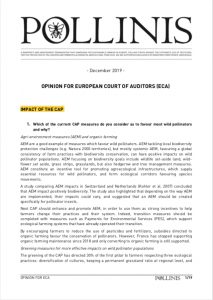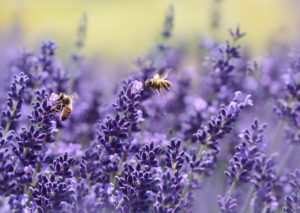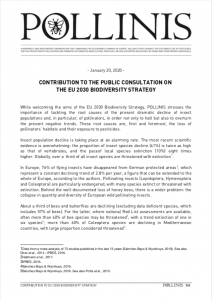Pesticides
Commentaires de POLLINIS pour la Cour des comptes européenne (ECA)
POLLINIS a été sollicitée par la Cour des comptes européenne dans le cadre de son rapport sur le déclin des pollinisateurs en Europe. L’ONG a envoyé, en décembre 2019, des observations sur l'impact de la PAC, la conservation de la nature, l’usage des pesticides. Des mesures ont aussi été suggérées pour la réforme de la PAC et la restauration des habitats. (Document en anglais)
La Cour des comptes, chargée d’auditer les politiques européennes, a récemment mené une grande enquête sur le déclin des pollinisateurs sauvages et sur la cohérence de l’action de la Commission européenne face à ce déclin.
Dans ce cadre, les auditeurs ont sollicité commentaires et avis auprès des ONG. POLLINIS a été identifiée comme l’une des organisations-clés sur ce sujet et a participé en envoyant une série d’observations sur l’impact de la Politique agricole commune (PAC), les mesures de conservation de la nature, l’utilisation des pesticides…
POLLINIS a également fait des propositions concrètes, pour des mesures favorables aux pollinisateurs dans le cadre de la renégociation de la PAC, comme le paiement des agriculteurs pour les services environnementaux, ou la restauration des habitats des espèces sauvages (haies, prairies, jachères fleuries…).
Au sujet des risques posés par les pesticides, POLLINIS a défendu l’adoption des « tests abeilles », et a dénoncé le rôle de l’agrochimie dans le blocage de ces protocoles cruciaux pour déterminer la toxicité réelle des pesticides avant leur mise sur le marché.
- Questions posées à POLLINIS
- Which of the current CAP measures do you consider as to favour most wild pollinators and why?
- Which CAP measures do you consider to have potential negative impacts on wild pollinators?
- Would you recommend any specific studies, reports or evaluations of these measures and their impact on pollinators?
- How relevant do you think the measures included in the EU Biodiversity Strategy and the Habitats Directive are for wild pollinators?
- What should the Commission do to efficiently address the decline of pollinators in nature conservation measures?
- What are in your opinion the most important monitoring schemes at EU and Member States level of wild insect pollinators and their main habitats (such as on semi-natural grasslands, environmentally sensitive permanent grasslands etc.)? Do they provide a sound basis for decision-making at European level/Member State level?
- What do you think are the main weaknesses in the current assessment of the impact of active substances on pollinators?
- What do you think are the main reasons behind the non-approval of the 2013 Bee Guidance by the Member States?
- When the 2013 Bee Guidance document was prepared, some test methods were missing. In your opinion, has this gap been filled-in since 2013?
- The Commission launched the review of the 2013 Bee Guidance. What do you consider to be the main threats in the current process? What is your opinion on the composition of the stakeholder consultative group for this review?
- When the Commission reassessed in 2012 clothianidin, imidacloprid and thiamethoxam using the 2013 Bee Guidance, do you know why acetamiprid and thiacloprid were not included?
- The Commission proposed decisions to stop Romania and Lithuania from granting emergency authorisations of the banned neonicotinoids for future seasons. The ScoPAFF vote resulted in no opinion. What do you think the Commission should take as next steps to ensure that unjustified emergency authorisations are granted?
- Do you think the ban of the three neonicotinoids had a real impact on the decline of pollinators if alternatives are other chemical products for which the 2013 Bee Guidance is not fully applied? What is your opinion on EFSA establishing that acetamiprid has a low risk for bees?
- Do you know which control measures are used in France as an alternative to banned neonicotinoids and whether such practices could be transferred to other Member States?
- What is your opinion on the EU Pollinators initiative? Do you think the initiative and its action plan efficiently tackle the main threats to wild pollinators in the EU?
- Is the initiative likely to halt the decline of wild pollinators in Europe? If not, what are the most important elements lacking?


